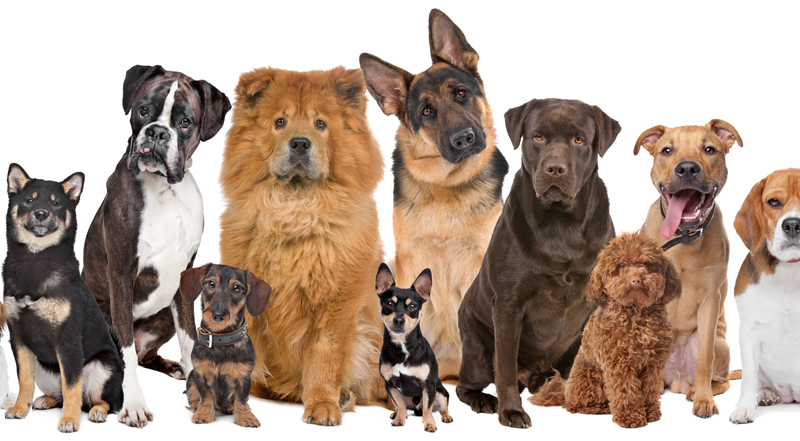
Golden Retriever Pointer
Springer Spaniel Cocker Spaniel
Irish Setter Brittany
Gordon Setter Weimaraner
Greyhound Blood Hound
Dachshund Whippet
Doberman Rottweiler
Boxer English Mastiff
St. Bernard Siberian Husky
Great Dane Bernese Mt. Dog
Border Collie German Shepherd
Welsch Corgi Australian Cattle Dog
Puli Shetland Sheep Dog
Briard Canaan Dog
Bullterrier Airedale Terrier
Welsch Terrier Scottish Terrier
Jack Russel Miniature Schnauzer
Weaten Terrier West Highland
Chihuahua Yorkshire Terrier
Pomeranian Toy Fox Terrier
Pekingese Shih Tzu
Pug King Charles Spaniel
Dalmatian Chow Chow
Boston Terrier Bichon Frise
Lhasa Apso Shiba Inu
Sporting Group: When you think sporting, think hunters; pointing, flushing, and retrieving. Sporting dogs need long fast walks. Adding a dog backpack can be a great physical and psychological challenge for these dogs. These dogs love to run, so biking, rollerblading, or skateboarding are a great way to drain their energy. Once their energy has been drained, various games can be played with them to stimulate the drive of their breed.
Sporting dogs are often great at…
– Catching discs
– Water activities: swimming, dock jumping, fetching in the water
– Pointers: hide an object with a familiar scent & guide her as she seeks it out & points
– Spaniels: hide an object or family member hides & she find them
– Retrievers: hide an object & they bring it back unharmed
– Search & Rescue Driven Dogs: have family members hide, allow the dog to smell an item belonging to one of those family members, & have her find that particular individual
Hound Group: This group can be divided in to two categories, scent hounds and sight hounds.
Hound dogs are often great at…
– Scent Hounds: on your walk, have family members hide, and allow your dog to seek them out. This creates both a physical and psychological challenge.
– Sight Hounds: these hounds are bread for sprinting. Rollerblading or biking with these dogs are a great option for draining energy. They also enjoy a quick sprint followed by a walk.
Working Group: Working dogs are breed for strength. Because of this, it is extra important to drain their energy everyday by walking, rollerblading, or biking. It is also important to remember that these dogs want a job.
Working dogs are great at…
– Pulling or Carting: if you have a working dog you can get them fitted for a pulling harness and have them pull wagons or carts. Activities such as dog sledding, skijoring, or bikejoring are perfect ways to give them an opportunity to pull.
Herding Group: Herding dogs have very high energy. It is important to bike, walk, run, or rollerblade with them briskly for 30-60 minutes, and then to take them on a shorter walk later on. This will help drain their energy.
Herding dogs are often great at…
– Disc: make her wait in between throws by doing commands such as sit, lay down, or stay. This will add a psychological challenge to the activity.
– Agility: create your own DIY agility course with items around the house: jumps, tunnels, wait table, hoops, etc.
– Flyball: this is a fast pace relay race where a dog runs through the course, releases a ball, and brings it back to the owner. The second dog in the relay is not allowed to started until the first dog comes back, creating a physical and psychological challenge.
Terrier Group: Terriers tend to be either hunters or workers. They tend to be high energy, so two walks a day is important. Some can benefit from carrying a backpack or running while their owner bikes, runs, or rollerblades.
Terriers are often great at…
– Tricks and Commands- following exercise, terriers thrive on tricks and commands using positive reinforcement. This helps to redirect them from any unwanted behaviors.
– Catching discs
– Flyball: (see Herding Group)
– Agility: great for high energy terriers (see Herding Group)
– Muscular terrier breed (like pitbulls): pulling activities (see Working Group)
Toy Group: dogs in this category are typically bird dogs or ratters. The activities you do with them will be dependent on their energy level.
Toy dogs can be great at…
– Catch
– Agility: (see Herding Group)
– Flyball: (see Herding Group)
– Obedience training with rewards
Nonsporting Group: to meet the needs of these dogs, it is dependent on the breed. Observe your dog. What is his drive? Is he a puller? Does he like to retrieve? Is he a runner? Using the above information, you can find multiple activities that will meet the needs of your dog.
Happy hunting! Happy finding! Happy pulling! Happy running! Happy catching! Happy jumping! Happy dog!
